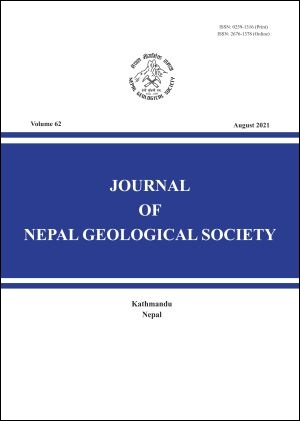Shallow soil effects for contrasting PGAs at nearby strong-motion stations during the 2017, Mj 5.2, southern Akita Prefecture earthquake
DOI:
https://doi.org/10.3126/jngs.v62i0.38692Keywords:
Southern Akita Prefecture Earthquake, Ground motions, PGA, PGV, Site amplificationAbstract
On September 8, 2017, an earthquake of Mj 5.2 occurred with the epicenter in southern Akita Prefecture, Japan, at 22:23 local time. According to the Japan Meteorological Agency (JMA), the focal depth was 9 km. Many strong-motion stations of K-NET and KiK-net recorded ground motions from the earthquake. The maximum horizontal vector peak ground acceleration (PGA) of approximately 136 cm/s2 was recorded at one of the KiK-net stations at an epicentral distance of about 8 km. However, despite being 37 km and 53 km far from the epicenter, two stations recorded PGAs of approximately 126 and 113 cm/s2, respectively, similar to that near the epicenter. Even though these PGAs are not rare, we found that the PGAs at the two sites strongly deviated from the median values suggested by a ground motion prediction equation (GMPE), while the nearby sites generally followed the GMPE. Available velocity models showed that shallow shear wave velocities, especially in the top 5 m, were lower (i.e., the soils were softer) at the two sites compared to those at their nearest neighboring sites. We compared the ratios of the PGAs and peak ground velocities (PGVs) at the two sites with respect to their neighboring sites for many earthquakes covering a wide range of magnitudes and azimuths. We found that the PGAs and PGVs at the two sites were systematically larger than those at the adjacent sites. Linear theoretical site amplifications using the available soil models gave peak frequencies around 6-8 Hz at the larger PGA sites. Bandpass-filtered records showed significantly larger PGAs around these frequencies at the larger PGA sites. The above results showed that local site condition is one of the major contributing factors to induce large PGAs. Furthermore, softer sites experience more substantial nonlinear site amplification than the stiffer sites when input motions exceed some threshold PGAs. This latter effect means that the softer sites can produce a variety of ground motion spectra. Nevertheless, the degree of damage to built structures depends on several factors, including the design and quality of construction. We expect that this study contributes to developing improved microzonation maps for earthquake disaster mitigation.
Downloads
Downloads
Published
How to Cite
Issue
Section
License
© Nepal Geological Society




